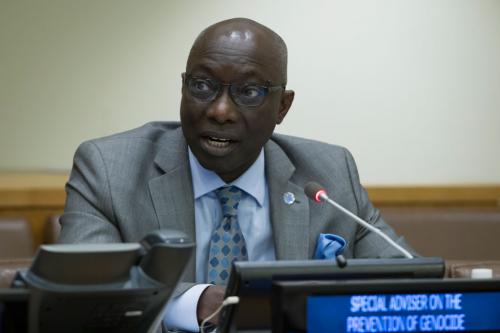Bahrain: UN special adviser stresses urgency of de-escalating tensions sparked by protests
Noting the new protests and increased tensions in Bahrain triggered by the revocation of the citizenship of a prominent Shia religious leader, a senior United Nations human rights advisor called on the Government to ensure that the right to freedom of peaceful assembly is fully respected and that any response to the protests is in accordance with the country’s obligations under international human rights law.

Special Advisor to the Secretary-General on the Prevention of Genocide Adama Dieng.
Adama Dieng, the UN Special Adviser on the Prevention of Genocide also called on the protestors to exercise their rights peacefully and to avoid any act of violence, as well as on all decision-makers, in the country and at the regional level, political parties and groups, military, religious, tribal and community leaders to exercise restraint and to take all possible measures to prevent the further increase of tensions.
According to a statement by his office on June 22, the Special Adviser noted that the 20 June action by the Interior Ministry of Bahrain to revoke the citizenship of Sheikh Issa Qassem, a Shia religious leader, is the latest in a series of actions by the authorities in recent weeks that have further restricted space for public participation and the enjoyment of human rights in the country.
The day before, the UN Office of the High Commissioner for Human Rights (OHCHR) expressed concerns at crackdown on human rights and political opposition groups including the action against the Shia religious leader, the re-arrest of Nabil Rajab, a prominent human rights defender, the dissolution of Al Wefaq, Bahrain’s largest opposition political grouping, the interrogation of five Shia clerics, and the travel bans on a number of human rights defenders.
Moreover, on 16 June, in a statement issued by his spokesperson, UN Secretary-General Ban Ki-moon expressed concern at the situation in the country and noted that such actions by the State authorities could potentially damage the human rights situation in the country as well as undermine the reforms undertaken by King Hamad ibn Isa Al Khalifa.
In his view, Mr. Dieng said, “the country and the region are facing a critical moment. It is now even more crucial for the authorities and for all relevant parties to recommit to an inclusive national dialogue in the interest of all people of Bahrain.”
Source: United Nations
- 343 reads
Human Rights
Fostering a More Humane World: The 28th Eurasian Economic Summi

Conscience, Hope, and Action: Keys to Global Peace and Sustainability

Ringing FOWPAL’s Peace Bell for the World:Nobel Peace Prize Laureates’ Visions and Actions

Protecting the World’s Cultural Diversity for a Sustainable Future

Puppet Show I International Friendship Day 2020

